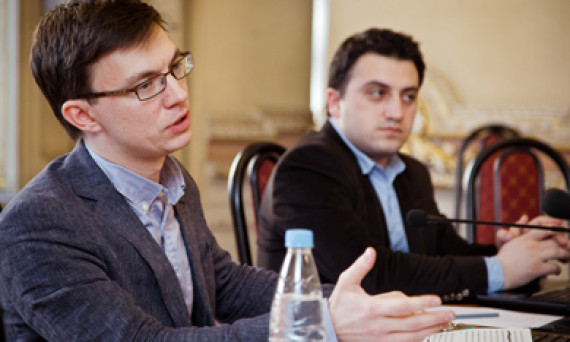10 апреля Илья Яблоков (University of Manchester) посетил Европейский университет и прочитал лекцию в рамках серии воркшопов, организованных программой IMARES.
Ilya Yablokov started the lecture with an introduction to the methodology applied to study of conspiracy theories and admitted that Russian scholarship on the topic is still very limited. In the first part of the lecture he gave a brief history of the academic studies on conspiracy theories which originated in the mid-20th century in the USA. With a particular stress on conspiracy theory as a populist theory of power, Yablokov then elaborated more on the topic and the connection between Russian domestic and foreign politics and conspiracy theories.
Referring to Andrei Zorin's study of literature of Imperial Russia, Yablokov suggested that conspiracy theories emerged among intellectuals in Russia as early as in the 18th century. However, from the mid 19th century the West traditionally has been the ultimate conspiring 'Other' in such theories and often provided a ground for social cohesion.
According to Yablokov, the understanding of the populist dimension of conspiracy theories helps explaining the attempts of various politicians both in Russia and in the world, in general, to use conspiracy theories in order to delegitimize their opponents and competitors. He also showed how the image of the West as a single, conspiring entity can work for the purposes of national cohesion.
The second part of the lecture was devoted to the Pussy Riot Trial as the selected case study of application of conspiracy theories in the public space through the media. In a brief but fascinating story Yablokov introduced how Russian media and the Orthodox Church have been representing the Pussy Riot activists as witches, demons and provocateurs. He then showed how the image of the Orthodox Church became central to the nation-building discourse in the country in 2012 and how this image changed by the end of the media campaign against Pussy Riot from the victim to the Peacemaker.
The floor was then open for questions. It seemed as if Ilya Yablokov had kept the best anecdotes and examples of other cases of conspiracy theories for this last part of the event. EUSP students were asking questions on numerous issues related to the USA, Russia and Ukraine. Artem Magun, the Dean of the Department of Political Science and Sociology, EUSP was more interested in Yablokov's methodological and theoretical approach and seemed to like the joke about Americans being lucky to have only one Fox Channel while Russians have to watch more of similar content on numerous channels.
Gevorg Avetikyan








